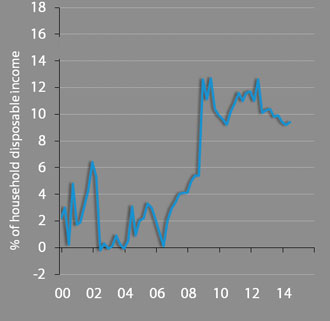-
Consumer caution has been a feature of the Australian economic landscape for some time now, recognisable in higher-than-average deposits, mortgage repayments and household saving rate.
To some extent, this is inhibiting the transmission of monetary policy in the country, with wealth effects yet to provide a real kick-start to consumer spending or the wider recovery.
"While consumer confidence remains fragile, seven years of household balance sheet repair has left households in much better shape."
ANZ ResearchThe behaviour of the household saving rate is perhaps one of the best illustrations of the rise of caution among households.
The saving rate steadily declined through the 1990s and early-to-mid 2000s as a reduction in real interest rates and financial liberalisation drove a sharp run up in household debt.
The savings rate remains elevated

By the mid-2000s, households were feeling so confident about the outlook they were saving virtually nothing out of their income.
Even before the big hit from the global financial crisis, however, households began to lift the savings rate, although strong growth in incomes allowed them to maintain a high rate of spending.
Post the global financial crisis, the saving rate rose sharply to peak at over 12 per cent in 2009, the highest level since the 1980s. This occurred as households attempted to repair their balance sheets damaged by sharp falls in asset prices.
While consumer confidence remains fragile, 7 years of household balance sheet repair has left households in much better shape. Moreover, there are early signs that risk aversion is abating.
The trajectory for consumer confidence remains important for the consumer spending outlook.
While ongoing soft wage growth will continue to weigh on spending, a moderate pick-up in growth in household consumption, helped by a further gradual fall in the savings rate, looks likely.
The views and opinions expressed in this communication are those of the author and may not necessarily state or reflect those of ANZ.
EDITOR'S PICKS
-
ANZ’s chief economist Warren Hogan, in an overview of key concerns facing the Australian economy, looks at housing bubbles, the fall of the Australian dollar, interest rates and the China issue.
2014-11-21 18:52 -
There is one industry which should be happy with increasing regulation in Australia: accounting. Most of the industry’s revenue growth over the past few years has come at the hands of audit compliance and financial reporting.
2014-11-18 17:53 -
The big news this week is the Australia-China free trade agreement which, when announced, will reportedly exceed industry forecasts. It's expected the breadth of concessions made by China will benefit Australia to the tune of $18 billion over 10 years, surpassing estimates.
2014-11-17 19:40
